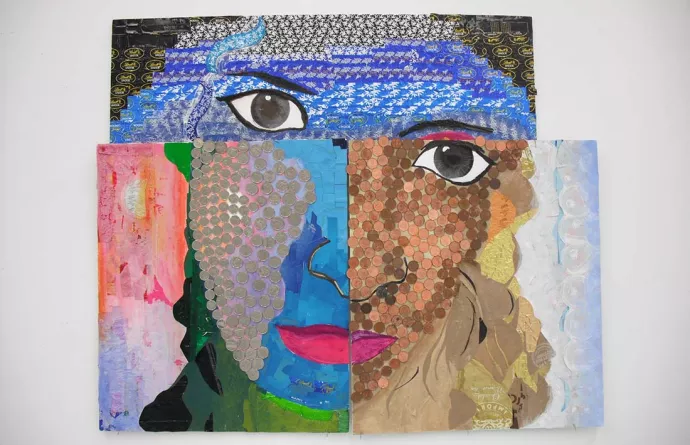
The Department of Visual Studies (DVS) is a small yet complex unit featuring multiple academic programs and the Blackwood Gallery.
The faculty complement is 11.5, 3.5 of whom are not white and who are specialists in non-Euro-North American areas of study. One is a Full Professor (Kajri Jain: south Asian contemporary art), and the other three are Assistant Professors (Elizabeth Wijaya: East Asian cinema; Ruba Kana’an: Islamic art; and Maria Hupfield: Indigenous art). Maria Hupfield holds a Canadian Research Chair in Transdisciplinary Indigenous Arts; she is 0.5 in E&D. The faculty's teaching focuses on their areas of specialization.
Jump to:
Departmental Statements
Commitment to Diversity and Inclusion
DVS is committed to doing its part to effect positive change. We strive to create an anti-racist, inclusive, diverse and equitable learning environment where everyone belongs. We are a diverse community, with BIPOC, Latinx and other people in underrepresented groups working together as professors, staff members, sessional instructors, postdoctoral fellows, and teaching assistants. This doesn't mean our work is done — far from it. Read more »
Curriculum and Course Offerings
Within the Faculty
The DVS Curriculum Committee is currently examining the three program streams in DVS (Art History, Visual Culture and Communication, and Cinema Studies) to evaluate how to better represent the EDI components of our courses and how to update courses or streams that have not changed very much in recent years.
Courses offered by the four professors named above have diversified our curriculum in marked ways; here are a few samples:
- FAH275H: Introduction to Indigenous Art in Canada (Hupfield). View equity statement in syllabus »
- FAH282H: Gardens, Homes, and Palaces in the Muslim World (Kana’an)
- CIN207: East Asian Cinemas (Wijaya)
- CIN215: Bollywood (Jain)
- FAH395H: China to Baghdad: Encounters on the Silk Road (Kana’an)
- CIN403: Queerscapes, Screenscapes, Escapes: Gender and Sexuality Across East and Southeast Asian Cinemas (Wijaya). View equity statement in syllabus »
DVS faculty in other areas have also diversified their course offerings, such as:
- FAH215 and FAH216: Early and Later Medieval Art (Caskey) treat Indigenous and African arts
- VCC290: Masculinities (Heckel; LTA)
- FAH356: Colonial Latin American Art (Levy)
- VCC400: Visualizing Global Capital (Stoddard; LTA)
Our gateway course in art history, FAH101, has been gradually been moving away from a traditional focus on the predominantly White canon of Western art. In Fall 2022, it will be entirely reconfigured as a global course, with balanced content dealing with arts by sub-Saharan African, southeast Asian, Chinese, and Indigenous groups as well as European and North American ones.
Beyond the Faculty
When hiring sessional instructors for Topics courses, DVS has made a concerted effort since 2020 to prioritize course proposals that focus on global or equity topics and decolonizing methodologies, and to hire BIPOC people to teach them. Examples include:
- CIN290H: Art and Life: Historical Reflections in East Asian Cinema (Bo Ruochen, 2021)
- FAH295H: Global Renaissance (Colin Murray, 2022)
- FAH392H: South Asia, Colonialism, and the Visual Arts (Farrukh Rafiq, 2021)
- FAH392H: Modern & Contemporary African and African Diasporic Art & Expressions of Self (Jessica Cook, 2022)
- CIN301H: Cinema of AIDS/HIV (Roshaya Rodness, 2021). View equity statement in syllabus »
- CIN301H: How Independent Films Get Produced (Weijie Lai, 2020)
- VCC392H: Visual Culture and Media Infrastructures (Mariam Karim, 2021)
- FAH390H: Decolonizing Art History (Farrukh Rafiq, 2021)
- VCC392H: Visual Politics and Power in Processes of Racialization and Resistance (Rochelle Safiyah, 2021)
- VCC400H: Global Solidarity Movements (Nikolas Drosos, 2021)
- VCC490H: Cultures of Exclusion and Cultures of Participation (Anil Narine, 2020)
Additional EDI Initiatives
Seeds of Change
To encourage faculty and “repeat” sessionals to seek out training or programming to diversify the curriculum, the DVS Seeds of Change program was established in 2020.
Seeds of Change is an initiative to support innovative teaching methods that address racism in a variety of settings. Many types of pedagogical projects are eligible for seed funding, from designing new courses and creative assessments to reconfiguring existing ones. Priority is given to projects that actively confront racism either through the subject taught or method used, such as:
- racism and white privilege in scholarship and theory;
- BIPOC artists, filmmakers, critics, curators, theorists, or historians;
- structural racism in various institutions;
- decolonizing pedagogies and perspectives.
There have been two rounds of applications thus far (the third is in process), with proposals awarded for helping students network with Asian filmmakers on production processes, to decolonizing Art History and FAH101. The following courses have been supported by Seeds of Change:
- CIN301H: How Independent Films Get Produced (Weijie Lai, 2020)
- CIN301H: Making a Short Film (Weijie Lai, 2021)
- FAH390H: Decolonizing Art History (Farrukh Rafiq, 2021)
- FAH101H: Intro to Art History (Levy 2019-2021; Caskey 2022)
- CIN400H: Decolonizing the Image in Third Cinema (Stoddard, 2021)
Student Recruitment (in Process)
DVS has collected the names and email addresses of art teachers in public schools in Ontario that have arts programming (not only arts' schools but those with Digital Arts SHSMs or other programs, such as Central Toronto Academy).
In addition, DVS has extended recruitment efforts to northern Ontario, contacting high schools in Sudbury and Thunder Bay, in hopes that this will further diversify their remarkably global student population.
Blackwood Gallery
The Blackwood’s public-facing research program and programming (both online and in person) are at the forefront of EDI efforts, with artists from around the world engaging in deeply considered debates and conversations on the salient issues of today.
Representative of the Blackwood’s initiatives are the recent Artists-in-Presidents: Transmissions to Power project and the current Unruly Archives, which is part of the Lighbox program on the UTM campus.
Last updated August 2023
